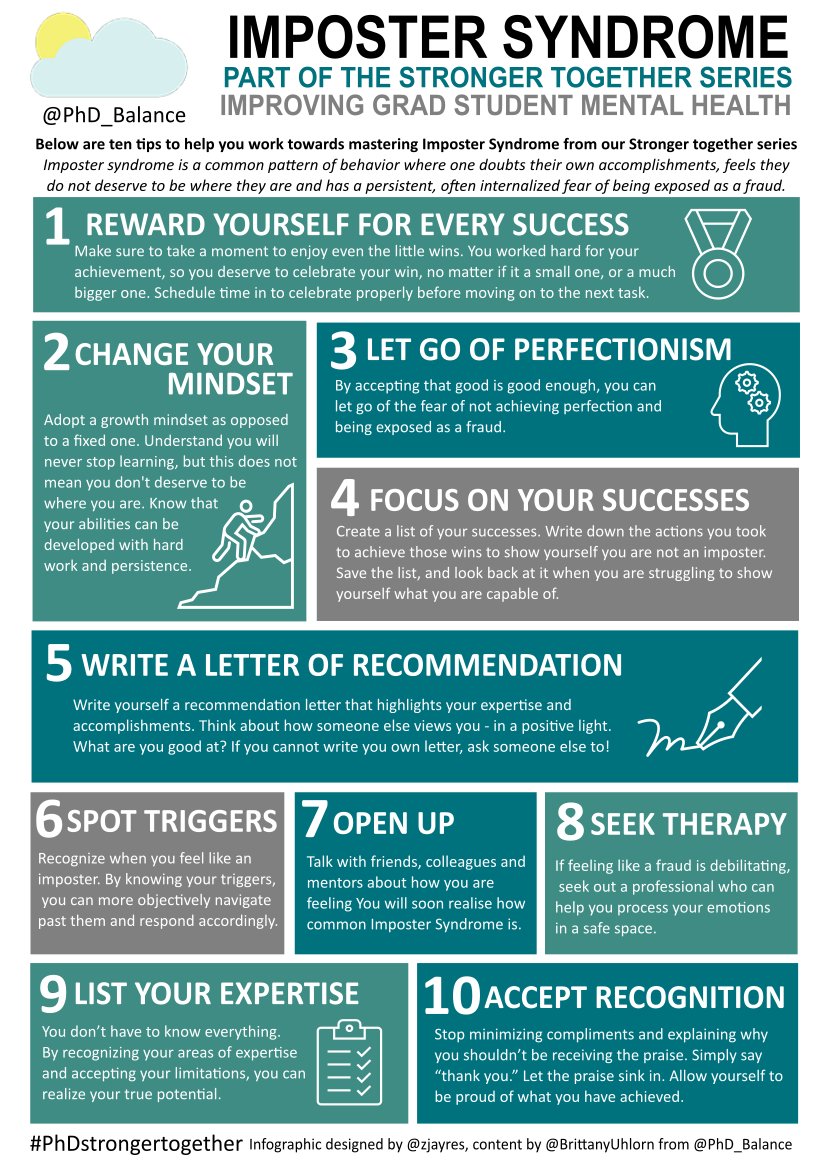Impostor syndrome often comes up in this community. It can affect our lives during grad school (& afterwards) in many different ways. Remember that you are not alone & there are ways to overcome this. We Can't All Be Impostors, Can We? #PhDStrongerTogether #ImpostorSyndrome
Look back on our Infographic (created by @ZJAyres ) from May showing 10 different methods you can use to master your Impostor Syndrome!
(Text description in tweet thread below)
#PhDStrongerTogether #PhDBalance
(Text description in tweet thread below)
#PhDStrongerTogether #PhDBalance
Imposter syndrome
Part of the stronger together series – Improving grad student mental health. Below are ten tips to help you work towards mastering Imposter Syndrome from our Stronger Together series.
Part of the stronger together series – Improving grad student mental health. Below are ten tips to help you work towards mastering Imposter Syndrome from our Stronger Together series.
Imposter Syndrome is a common pattern of behaviour where one doubts their own accomplishments, feels they do not deserve to be where they are and has a persistent, often internalized fear of being exposed as a fraud.
1 Reward Yourself for Every Success! Make sure to take a moment to enjoy little wins. You worked hard for your achievement so you deserve to celebrate it, no matter if it is a small one, or a much bigger one. Schedule time to celebrate properly before moving on to the next task.
2 Change Your Mindset. Adopt a growth mindset as opposed to a fixed one. Understand you will never stop learning, but this does not mean you don’t deserve to be where you are. Know that your abilities can be developed with hard work and persistence.
3 Let Go Of Perfectionism. By accepting that good is good enough, you can let go of the fear of not achieving perfection and being exposed as a fraud.
4 Focus On Your Successes! Create a list of your successes. Write down the actions you took to achieve those wins to show yourself you are not an imposter. Save the list and look back at it when you are struggling to show yourself what you are capable of.
5 Write A Letter of Recommendation. Write yourself a recommendation letter that highlights your expertise and accomplishments. Think about how someone else views you – in a positive light. What are you good at? If you cannot write you own letter, ask someone else to!
6 Spot Triggers- Recognize when you feel like an imposter. By knowing your triggers, you can navigate past them and respond accordingly.
7 Open Up. Talk with friends, colleagues, and mentors about how you are feeling. You will soon realise how common Imposter Syndrome is.
7 Open Up. Talk with friends, colleagues, and mentors about how you are feeling. You will soon realise how common Imposter Syndrome is.
8 Seek Therapy- If the feeling is debilitating, seek out a professional who can help you process your emotions in a safe space
9 List Your Expertise. You don't have to know everything. By recognizing areas of expertise & accepting limitations, you'll realize your true potential.
9 List Your Expertise. You don't have to know everything. By recognizing areas of expertise & accepting limitations, you'll realize your true potential.
10 AcceptRecognition. Stop minimizing compliments & explaining why you don't deserve it. Simply say thank you. Let the praise sink in. Allow yourself to be proud of what you have achieved. Infographic designed by @ZYAyres content by @BrittanyUhlorn ( @PhD_Balance)

 Read on Twitter
Read on Twitter



